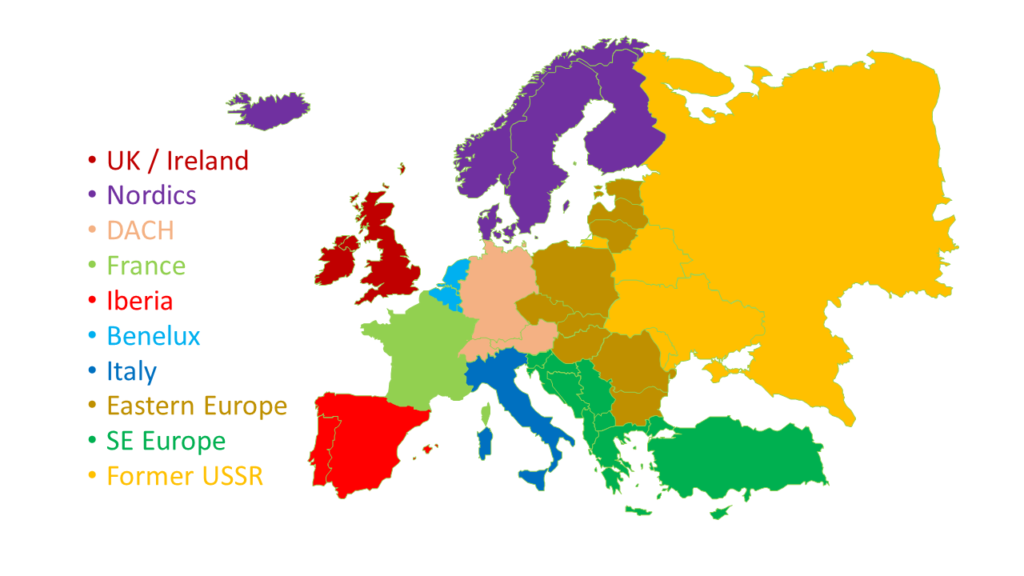Where in Europe?
For this instalment of my series on expanding your enterprise software business to Europe, I want to share my thoughts on how you might go about deciding where in Europe to begin. As I said previously, Europe Is not a single homogeneous region, but consists of some 50 countries, around 45 official languages, 25 different currencies, and a huge variety of cultures.

It therefore makes sense to start with some degree of focus in one or two countries or a particular region of Europe containing countries with similar characteristics. For this, I like to use the model illustrated on the left that divides Europe into 10 regions.
There are then several aspects of the analysis that must be performed:
Market Size
This is a basic exercise as taught in any MBA or Marketing course. The most relevant factors will depend on your particular application but will likely include GDP, GDP growth, population (possibly profiled by age etc.), number of companies in relevant industries of appropriate size, attitude to technology adoption, and so on. The output of this part of the analysis will be an estimate (guess!) of the number of opportunities and their value that might be available in that market.
Competitive Landscape
Competition is generally a good thing as it proves that there is a market (unless you are taking a Blue Ocean strategy). But are there existing well-established local competitors with a stranglehold on the market? On the other hand, is there a local competitor that is struggling due to having an inferior product that might want to partner with you and your superior product?
Ease of Doing Business
Is the business regime open to outsiders? How easy will it be for your staff visiting from the home office to obtain any necessary visas or work permits? What is the local labour pool for the resources appropriate to your business? How stable is the local currency? Are there tax incentives for investing in the market?
Existing Customers
Do you already have customers (subsidiaries of clients at home) in any European countries? Are they referenceable? Can they provide you with local intelligence on the market? Are any existing home-based customers looking to expand their use of your system to Europe?
Partnerships
Do any of your partners have a European presence? How can you leverage that? Whether they are resellers or systems integrators, they are likely to have a good understanding of the local markets in which they operate.
Culture
And finally, what is the cultural match between your business / home country and your target country? This can be one of the trickiest aspects of global expansion. Most American and Australian companies start their European odyssey in the UK because of the common language, and the language barrier cannot be ignored if you are planning to make use of head office staff in Europe. And while English is now spoken widely across the world, relying on that can put you at a severe disadvantage when competing against local vendors with native speakers. But culture is much more than language and deserves an article of its own. The way meetings are conducted and decisions made, attitudes to time-keeping, and the sanctity of the lunch break are just some of the examples of why it can be frustrating to do business in a different culture and why it can be easy to cause offence.
After all this analysis, which will be specific to your business, it is unlikely that there will be a single country or region that ticks all the boxes above all the others. But do not be tempted to target too many markets initially because they all look about the same. You must focus, and once you have achieved success in one market, will be better placed to attack the next. And by looking at all the factors identified above, and not just pure market size, may throw up some surprises. Many companies are finding success in the Nordic region for example – not the largest market, not English native speakers, but a great openness to the rest of the world.
